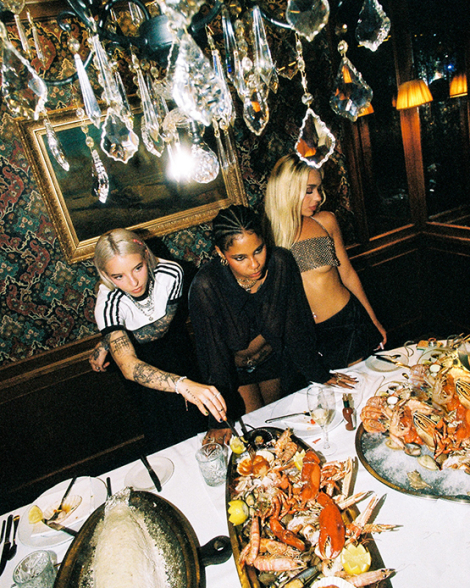Models, values and contradictions in new generations' music
- Culture Folder
- Trends
- Oct 23
- 13 mins

In the music of their era, every generation has found a vehicle for passing on values, lifestyles and collective aspirations. Lately, some of the most popular music genres have sparked controversy, due to their content and the language employed. But what kind of values do the lyrics of the singers and bands most in vogue convey to young audiences?
Each generation has been marked by the values it has identified with most. This trend has been going on for decades, but the major change seen in recent years is that our imaginary is now changing more rapidly than ever before in history. The generational leap in terms of culture, values and outlook on life is gathering momentum. Differences are no longer found just between parents and children, but even between very close generations, such as Millennials, Generation Z or the new Generation Alpha. Classification used to jump two decades and now only one decade at a time. But are these generational shifts really that important; has there been a real change in values, and are we happy with the way these values are being passed on?
These transmissions of values have not been linear. Some values fall by the wayside, while others are carried on and passed on from generation to generation. Sometimes nothing can be done. We cannot expect our children’s children to operate within the same intellectual and moral framework as we do. Does this mean that principles have been lost, as the more apocalyptic voices claim, or simply that the issues facing each generation as well as their understanding of the world differ?
Efforts have always been made to define generations with labels that, perhaps, do not entirely reflect the reality of each period. The 1970s were not solely the years of sexual freedom, nor were the 1980s the decade of superficiality, and we could go on and on right up to the present day. The renowned American journalist Chuck Klosterman raises these issues in his book The Nineties, in which he examines the characteristics of these years, but, at the same time, their contradictions and the things that linked them to or set them apart from previous decades. It may well be the case that we need to go beyond the present time to more accurately define the values of this generation and its contradictions.
The globalisation of culture
Today’s youth is the generation of precariousness, social media, the visualisation of mental health, new ways of understanding feminism, gender diversity, reggaeton and urban music, but also the generation of those who have to live at a time when neoliberalism has crept more than ever into our DNA, in which individualism has become a latent value, in which male chauvinism and the radical right are being reignited without our realising it, and in which the news makes us question what is true and what is not.
 Bad Gyal, Tokischa and Young Miko are the leading lights within the urban music generation. © Xavi Souto
Bad Gyal, Tokischa and Young Miko are the leading lights within the urban music generation. © Xavi SoutoBesides the family and educational environments, adolescents’ and young people’s contact with social values is marked by music, podcasts, YouTubers, Twitch livestreams, literature and youth comics – including manga and TV anime. Will this define their adulthood? Will it underline the contradictions that we have been talking about since the beginning of this text?
Taking music as a starting point, it is clear that – apart from the most popular pop music in the charts – we are witnessing the heyday of urban sounds and reggaeton. The spotlight is no longer only focused on English-language music, but Latin America has also gotten a strong foothold. Genres such as flamenco, trap, drill, dancehall and afrobeat have made their mark on the young people’s musical universe. We only have to look at the lyrics and music of artists such as Rosalía, Bad Gyal, Figa Flawas, P.A.W.N. Gang, 31 FAM, Rojuu, Lildami, The Tyets, Dellafuente, C. Tangana, Soto Asa, Quevedo and a long list that could go on and on. Not only do their rhythms draw on all this music from beyond the usual realms of influence, but the lyrics often draw on vocabulary – slang – from the Jamaican and Afro-American communities that laid the groundwork for trap and other styles. Nowadays, no teenager is surprised to hear a song containing words such as pussy, ratchet, gyal, nai, clicka… words that were sometimes born as derogatory terms, but which the artists made their own as a mark of pride.
The music scene in Catalonia and the rest of Spain has been very receptive to this influence. It is even common to hear Catalan artists attempting to adopt a certain Latin American or flamenco twang in their singing. Do you want examples? Listen to the repertoire of any of the artists mentioned above and you will find a few.
Also key is the time when they come on the scene. For the first time in the Catalan musical universe, they are artists who are children of a first generation of immigrants, many of whom have achieved resounding success and a surprising influence. Examples include Morad and Beny Jr – of Moroccan origin, in L’Hospitalet –, Cyril Kamer – of Cameroonian origin, in the neighbourhood of El Besòs – and Munic HB – of Gambian origin, in Sabadell –, all of whom have millions of plays on the platforms. We might even be surprised to hear the Catalan Alizzz proudly asserting his suburban roots. And let’s not forget the current repercussions of Korean K-pop, Japanese manga/anime culture and video games. However, in these cases, their influence is usually limited to the use of certain words or references to series or comics, in the case of lyrics, or to the aesthetics of album covers or video clips. The pre-eminence of music created in England and the United States shares the limelight with new cultural forms that are taking hold, and heavily so, in our culture. That’s what globalisation is about too.
The values passed on
Must we assume, then, that male chauvinism and homophobia are more prevalent than ever in the music that young people listen to, given the fact that reggaeton and dancehall have been labelled as genres with sexist and homophobic lyrics right from the start? Yes and no. As in all music genres, the diversity of artists and material in reggaeton, dancehall and music with Latin American and Jamaican roots is astonishing. Some of the artists we are familiar with or who initiated these genres may well have had lyrics and stances that are at odds with the values of today’s Western society.
But their evolution has led to the fact that, within the same music genre, there are songs in which women’s role is reduced to mere sexual objects of leading men, and lyrics that are true odes to women’s empowerment, or songs with queer content that perhaps cannot be found in other genres.
 Triquell, like Scorpio and JimenaJimGómez, participants in the music talent show Eufòria, are known for for their personality. © Helseye
Triquell, like Scorpio and JimenaJimGómez, participants in the music talent show Eufòria, are known for for their personality. © HelseyeWe live in a world of contradictions and this is one further example: can we consider reggaeton, dancehall or dembow to be sexist music genres? Perhaps they were initially and still are in the hands of some artists, but for others they are an ideal medium for conveying messages in favour of sexual or gender diversity. There are countless examples, many of them Catalan and Spanish artists, who have worked with these rhythms from a queer or LGBTI+ perspective (from Las Bajas Pasiones to Jedet, Tremenda Jauría or the Malaga-born trans artist La Dani). We can no longer speak of sexist music genres per se, but rather of the way some artists use songs to convey their perspective on masculinity and gender relations. This does not stop us from talking about music genres that, like pop music, give great prominence to empowered and, at the same time, highly sexualised women. But even if we are talking about objectification, today we find many examples that battle against the tide, featuring artists with non-normative bodies. We can point to cases such as those of the American Lizzo, the British Shygirl and the Spanish Lapili.
The transmission of values is a truly complex issue with many aspects to be analysed, but if we refer to culture and music, it is clear that we are also living at a time when feminism, resilience and sisterhood are very much part of the current discourse. There are male chauvinist attitudes, sexist artists, sexist communicators, but, at the other end of the spectrum, perhaps we have never seen so many examples of singers, YouTubers, podcasters or even comedians with a clear feminist perspective. In our country there are several, and many of them are well known among young audiences and teenagers. We can talk about the podcast Gent de Merda and the radio show Deforme Semanal Ideal Total, or monologists such as Ana Polo. Their success is a small sign that both Millennials and Generation Z know how to work hard to make their principles heard.
Nor can we overlook the step forward taken by bringing together the mental health issues that increasingly affect young people, teenagers and children in a hyper-communicated, hyper-connected and hyper-stimulated world. There are hundreds of examples, from current pop stars like Billie Eilish and Lewis Capaldi, to an urban music artist like the Catalan Kinder Malo, who has released a single, No te mates, in which he talks about how music has been healing for him and he explains to young people that there will always be people around them to help them overcome the worst times. Are these the same values that previous generations advocated and that their artists conveyed to us? Some, yes, others, maybe not.
The neoliberal perspective of success
If there is a sticking point concerning the values that music and culture pass on to young people today, there can be no doubt that it is the neoliberal perspective of success, of individualism, of a certain spirit of the “American dream” adapted to our mindset. Five years ago – in the framework of a round table organised by the Primavera Sound festival – when C. Tangana, Bad Gyal and Yung Beef, three of the biggest names amongst the Spanish urban generation, debated their relationship with capitalism and the big record companies, a large swathe of the audience aligned themselves with C. Tangana and his project’s entrepreneurial vision rather than with Yung Beef’s more romantic perspective.
The former was familiar with the tools offered by neoliberalism and wanted to profit from them; the latter attached more importance to not losing authenticity, even if this might mean making less money with their music. Over time, it is clear that the Madrid-born musician’s popularity has risen much more than that of the Andalusian artist, but it is no less true that the latter has held on to what he wanted: respect and authenticity. Again, contradictions.
 Genres such as flamenco, trap, drill, dancehall and afrobeat have gained a strong foothold. We only need to look at artists such as Rosalía. © Erika Kamano
Genres such as flamenco, trap, drill, dancehall and afrobeat have gained a strong foothold. We only need to look at artists such as Rosalía. © Erika KamanoEven so, C. Tangana’s point of view is much more widespread among young people than Yung Beef’s, which is perhaps much more related to the candour of the 1990s, when authenticity was a value that mattered, and a great deal at that. We only have to compare the world of urban music today with the beginnings of rap in Spain. In retrospect, we can see that most of the successful artists had bands at the centre (7 Notas 7 Colores, Sólo los Solo, Violadores del Verso, El Club de los Poetas Violentos), while, at present, the leading artists are solo artists, both in Spain and on the international scene. It is true that both C. Tangana and Yung Beef were part of bands (Agorazein and Pxxr Gvng, respectively), but their careers have taken off much more as solo artists. And this is even more apparent in hit TV talent shows for children and teenagers, such as Operación Triunfo and, in Catalonia, Eufòria, programmes that are subject to considerable scrutiny when broadcast on public television.
Are we conveying to young people that success in the world of music is a competition, that the best way to triumph in the world of pop is to take part in a television contest?
In Eufòria, the relationship between artistic criteria and audience criteria is not at all clear. Are we conveying to young people that success in the world of music is a competition, that the best way to triumph in the world of pop is to take part in a television contest? Or, on the contrary, are we encouraging interest in music among young people? Once again, a long list of contradictions: does Eufòria promote the Catalan music scene or does it create a new star system to turn good profits? Perhaps a bit of both.
The major problem with TV talent shows is that the TV stations that broadcast them consider – mistakenly, very mistakenly – that they have already met their music quota on their channels. Do we want a talent show as the ultimate representative of music on TV, paid for with public money and from which the record labels will subsequently profit? Or are we looking for a showcase for existing materials which, in actual fact, are practically banned from appearing on television? And wouldn’t both options be possible? Fortunately, it is also true that, if shows such as those by Triquell, Scorpio and Jimena Jim Gómez have managed to shine, it has been on account of their personality; and that the programme has done its bit to raise the generational issues we were discussing earlier, such as mental health and gender diversity. Issues that are on today’s global agenda and that have been repeatedly featured in the programme. In other words, it is yet another example of the fact that our world – irrespective of generations – is fraught with contradictions.
The newsletter
Subscribe to our newsletter to keep up to date with Barcelona Metròpolis' new developments




